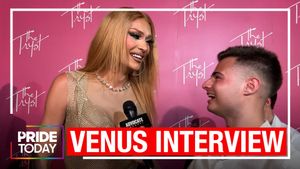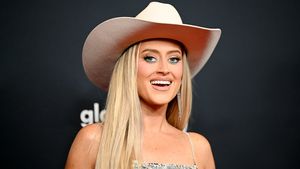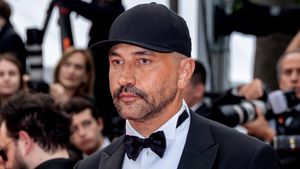When he burst onto the small screen in 1994, on TV’s sci-fi semiclassic Earth 2, Rockmond Dunbar was just a wide-eyed, fresh-faced kid from Northern California who was happy to be working in Hollywood. Dunbar was a rather green 21-year-old who shared the screen with other young notables (Rebecca Gayheart and Antonio Sabato Jr., to name two), but he caught the attention of fans—and Tinseltown insiders—right from the start. Today, fans know the 39-year-old Dunbar best for his iconic characters from acclaimed series—Kenny Chadway on Soul Food, C-Note Franklin on Prison Break, Pookie on The Game, Jalen on Girlfriends, Detective Mark Gustafson on Terriers, and his latest turn, as Lt. Eli Roosevelt of the sheriff’s department, the rare “good” guy on FX’s outlaw biker drama, Sons of Anarchy. With fame came an increasing presence as an activist, for gay rights (after appearing in the gay-themed film Punks and on gay TV series Noah’s Arc), African-American visibility in Hollywood, and HIV awareness. For years he’s been one of the few celebrities who has used his fame to push for more HIV testing among black men—with the Black AIDS Institute’s Greater Than AIDS campaign—and he’s taken on roles that show that people with HIV are not stock characters. He played a closeted married man with HIV on Private Practice and the conflicted brother of an HIV-positive man (played by Hill Harper) on Soul Food. Dunbar, who was named one of Television’s 50 Sexiest Stars of All Time by TV Guide, took a few moments on the set of Sons of Anarchy (which returns for its fifth season September 11) to talk about his iconic roles, what it will take to stop HIV, and how a DNA test changed his life.
HIV Plus: Your Sons of Anarchy character, Sheriff Eli, upends TV tradition. Too often when we have black men on-screen, they’re the criminals, not the cops. How do you see the character of Eli? Rockmond Dunbar: Not only a groundbreaking role in general, but he is another representation of a positive African-American male character in a stable, powerful, and impactful job. Sheriff Eli is acknowledged as being the greatest nemesis for the lead characters to date on the show.
There’s a scene on Sons where Jax, who the show centers around, is reading his dad’s journals about his motorcycle club. One line is “A true outlaw finds the balance between the passion in his heart and the reason in his mind. The outcome is the balance of might and right.” Do you think Eli has found the balance between the passion in his heart and the reason in his mind? Yes, he has. In the last episode, when Eli gives Juice [the bikers’ intelligence officer] back his case file he tells him, “You are a criminal, you do bad shit. I’m a police officer, I try to stop you.” This to me clearly demonstrates that Eli knows who he is and what he is really willing to do to bring righteousness and justice to his part of the world. Finding, knowing, and living that balance.
What about the Rockmond in real life? Have you found the balance between the passion in his heart and the reason? No.
It’s been said that Sons of Anarchy is based loosely around Hamlet. If so, where does Eli come in?Hamlet: Part II.
You’ve starred in some really interesting crime dramas: Terriers, Prison Break, Sons of Anarchy. Why are you drawn to those roles? Not drawn to them, but their spirit and energy are drawn to me. The roles sought me out. I enjoy each of the characters I have played in these series because they are well written and the characters live off the screen.
One of your more notable roles, Kenny on Soul Food, was another rarity on TV: a stable black businessman with a family. There was a lot of talk when you didn’t get the NAACP award for the role. What did you think about that? Everyone has voiced his or her opinion. It is not for the accolades or check that I work. It is for the chance to do great work. Accolades may come in the future, but everything comes in its time.
A lot of fans were pleased to see a show about African-American lives that didn’t have violence. It was a great show that was one of the longest-running African-American dramas featured on television. It was historic and needed. I wish it were still on.
One of the storylines on Soul Food revolved around your character’s brother, Kelvin, played by Hill Harper, coming out as HIV-positive. It was a struggle for both men. Do you think either of the characters was emblematic of how black men feel about HIV? It was a story that reflected real life. One of the millions of stories that can be portrayed.
Sometimes it seems like TV is still quite segregated. Shows with largely black casts, like Girlfriends, Soul Food, The Game, Moesha—well, white people, by and large, don’t watch those shows. Why do you think that is? People watch what they relate to. The networks are marketing to the masses and look to make money off their programming choices. Again, everything has its season.
UPN’s Girlfriends was a hundred times better than, say, Whitney, which gets decent ratings on NBC. What’s the difference? My friends created Girlfriends, and it was a positive reflection of their lives. Political agendas play into what is shown these days, and we need to understand how this figures in the choices being made on what to broadcast.
You had a really well-received role in the indie film Punks, a film about black gay men. What was the reaction to it? I was punished for taking that role. Equally applauded and parodied.
Did that change how you felt about the role? I still believe you do a role because it will change someone’s life. Regardless of the stones that are thrown, I did it with no regrets. I am an artist.
At the time, you told The Advocate that other actors wouldn’t take the role because of the kissing scene with another man. That was a decade ago. Is that fear still there among actors? Yes, the fear never goes away when your concern is how you will be perceived in the industry.
What kind of support have you gotten from the gay community? Tons of support. The most inspirational support was from E. Lynn Harris, a great writer and human being. I was invited to his house for dinner, and not only did he welcome me, but he was overt in his support and celebration of me as a heterosexual actor and the work I had done on-screen.
You also said that “we need to show that unicorns do exist,” which is a lovely statement. Do you think growing up in the San Francisco area helped you be more accepting? Growing up in the Bay Area gave me exposure that helped me be proud of where I am from, of who I was, and who I am today. It was a great melting pot of ideas and cultures.
You’ve joined other actors in promoting HIV testing in black communities. What’s the biggest misconception that prevents folks from getting tested? You can’t get results right away. Wrong. There is a cure for AIDS, so why get tested? Wrong. You can get tested, and in 15 minutes you’ll know the answer. A rapid test helps one know so that you can act immediately. And cost is not a determinant—testing centers all around the country offer free testing. Knowledge is power.
The HIV rate for black men is still soaring. What do you think will stop that? Education.
You played a closeted gay man with HIV on Private Practice. That was a really interesting arc. Did you empathize with the character? Yes, because being who you are and living freely is the most important thing we can do as people. His wife knew that he was sad because he was living a lie, and all she wanted for him was to embrace the truth—be who he was and she would still love him.
One of the charities you work with is the Black AIDS Institute. Why that organization in particular? The Black AIDS Institute is headed by Phill Wilson. Here is a man who not only talks the talk but also walks the walk. He’s a survivor for over 20 years with HIV. He knows what it means to be tested and receive that call. He also knows that hope can be found and full, productive lives created with the support of organizations like the Black AIDS Institute and the community at large. As they say, we are Greater Than AIDS.
You have a production company, Flypaper Entertainment, with Carol Ann Shine, who you worked with on Punks. Does that give you some freedom to create stories that aren’t out there? Yes. Carol and I are as different as night and day but alike in that we take our differences and create stories that reach out to all types of people. Stories with impact and meaning that show reflections of faces and lives on the silver screen we don’t usually see. We look beyond the apparent to the hidden, the surprising, and the story that you might pass in the blink of an eye and miss a lifetime of wonder. Different types of heroes who more broadly reflect those around us of every hue and belief.
You’re a diplomatic goodwill ambassador from Gambia, the smallest country in Africa. His Excellency President Yahya Abdul-Azziz Jemus Junkung Jammeh invited me to Gambia for an official state visit. The purpose was to build a bridge of art and communication between the people of Africa and African-Americans, to develop communication via storytelling that creates a commonality of language and emotion so that we change perceptions, break down stereotypes, and create new opportunities. This action may take time, but all involved are dedicated to making it happen.
You did a DNA test a few years ago. What did you learn? My DNA test was from my mother’s chromosomes. I utilized AfricanAncestry.com to run my test. I discovered I was from the Yoruba tribe in Nigeria. My new name, given during a ceremony in September 2011 in New York City at a gathering of the Nigerian tribes, is Omobowale (“the child returns home”) Adunbarin (“a man of the people”). I learned more about my heritage and ancestry and have shared that amazing experience with my family and my fans. Recently I took another trip with my mother, my girlfriend actress Maya Gilbert, and her mother to Nigeria and the Ivory Coast. This was a first-time trip for our mothers, and it was an experience that left us all speechless with wonder. We were able to celebrate the current talent in Nigeria as I awarded the best director prize and Maya the best leading actress award at the Africa International Film Festival.
Why was it important to find out about your heritage? Everyone should know about their past, their legacy, the accomplishments of our forefathers, and the accomplishments of our living relatives in Africa. [It offers] a richness of life that expands one’s heart and mind beyond the borders of the United States.
You probably did a lot of odd jobs to support yourself before your acting career really took off. What was the worst one? Everyone has that one job that teaches us how to dream, appreciate, and to never look back but keep on getting up when reaching for the dreams leaves us beaten. For me that job was the grocery store night stocker clerk, aisle 25, dog food. Dog food cans explode in the heat. There was a lot of work each night. Second job was a cow lot where I would shovel shit for compost all day in the heat and sun. Both jobs taught me humility, patience, and commitment. I had made a goal at the start of that summer and I did it. I bought a car and have been driving toward the future ever since.
















































































